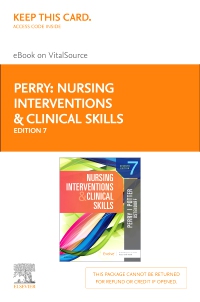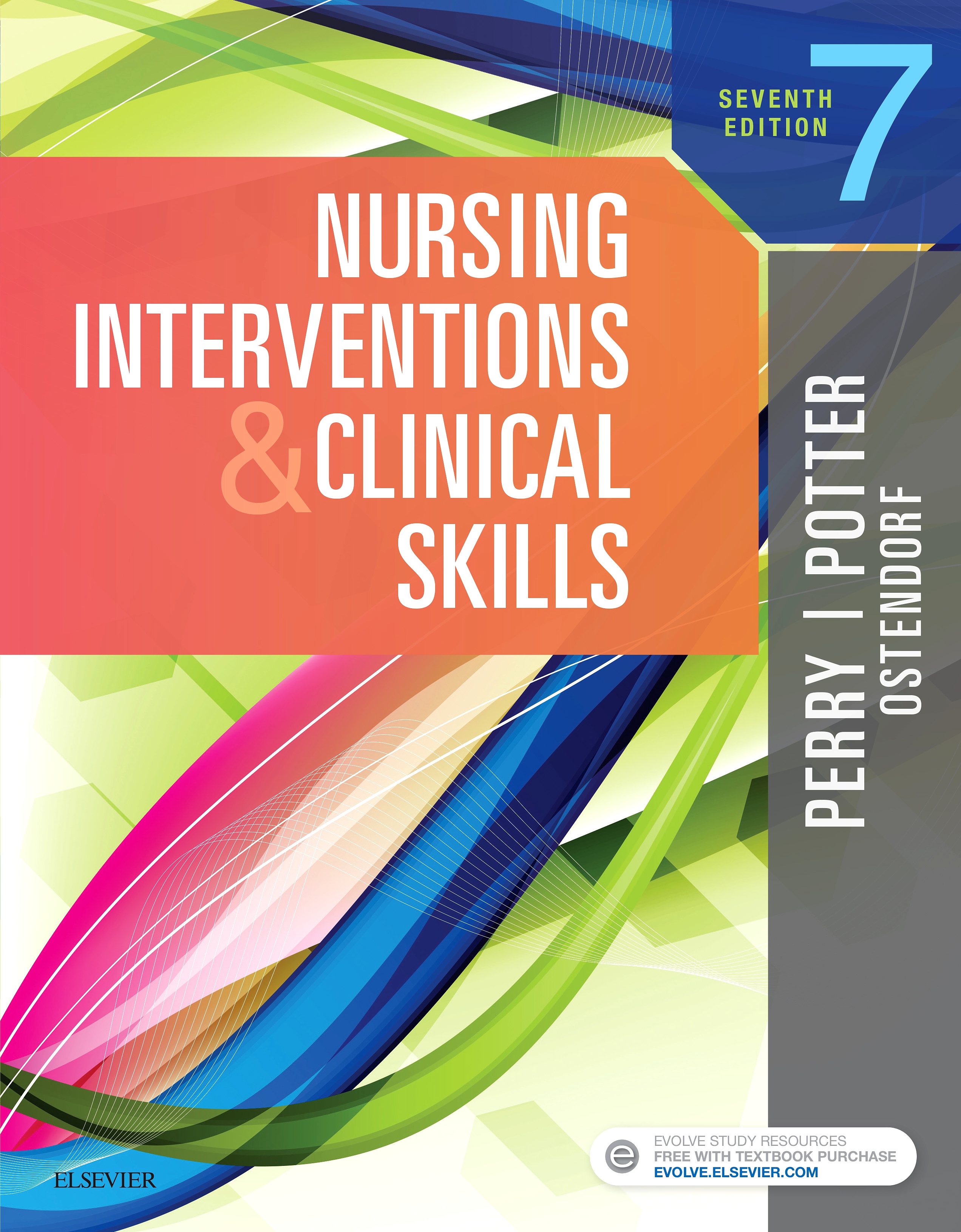
Nursing Interventions & Clinical Skills Elsevier eBook on VitalSource (Retail Access Card), 7th Edition
Elsevier eBook on VitalSource - Access Card

Guide your students through nursing skills! Perry, Potter, and Ostendorf’s Nursing Interventions & Clinical Skills, 7th Edition makes it easy for students to master the skills required in everyday nursing practice. Clear, step-by-step instructions cover more than 160 basic, intermediate, and advanced skills — from measuring body temperature to insertion of a peripheral intravenous device — using evidence-based concepts to improve patient safety and outcomes. A streamlined, visual approach makes the book easy to read, and an Evolve companion website enhances learning with review questions and handy checklists for each clinical skill.
-
- Coverage of more than 160 skills and interventions addresses the basic, intermediate, and advanced skills that students will use every day in practice.
- NEW! 2017 Infusion Nurses Society standards are included on administering IVs and on other changes in evidence-based practice.
- NEW Disaster Preparedness chapter focuses on caring for patients after biological, chemical, or radiation exposure.
- NEW! Three Master Debriefs help students develop a better understanding of the "big picture" by synthesizing skill performance with overall patient care.
- NEW! SBAR samples show students how to quickly and effectively communicate a patient’s condition in terms of Situation, Background, Assessment, and Recommendation.
- Delegation & Collaboration guidelines help in making decisions as to whether to delegate a skill to unlicensed assistive personnel, and indicates what key information must be shared.
- NEW! Practice Reflections sections include a clinical scenario with questions, helping students reflect on their clinical and simulation experiences.
- Unique! Using Evidence in Nursing Practice chapter provides the information needed to use evidence-based care to solve clinical problems.
- Coverage of HCAHPS (Hospital Consumer Assessment of Healthcare Providers and Systems) introduces the concept of evaluating hospitals with standardized surveys of patients’ perspectives of their care.
- Media resources include skills performance checklists on the Evolve companion website and related lessons, videos, and interactive exercises on Nursing Skills Online.
- Teach-Back step shows how to evaluate the success of patient teaching, so students can see whether the patient understands a task or topic or if additional teaching may be needed.
- Coverage of evidence-based nursing techniques includes the concept of care bundles, structured practices that improve patient safety and outcomes, in addition to the coverage of teach-back.
- Safe Patient Care Alerts highlight risks or other key information to know in performing skills, so students can plan ahead at each step of nursing care.
- Recording guidelines describe what should be reported and documented after performing skills, with Hand-off Reporting sections listing important patient care information to include in the handoff.
- Special Considerations indicate the additional risks or accommodations faced when caring for pediatric or geriatric patients, as well as patients in home care settings.
- A consistent format for nursing skills makes it easier for students to perform skills, organized by Assessment, Planning, Implementation, and Evaluation.
- NEW and updated photographs highlight changes in skills practice, ensuring that students learn safe and current patient care.
-
- NEW! 2017 Infusion Nurses Society standards are included on administering IVs and on other changes in evidence-based practice.
- NEW Disaster Preparedness chapter focuses on caring for patients after biological, chemical, or radiation exposure.
- NEW! SBAR samples show how to quickly and effectively communicate a patient’s condition in terms of Situation, Background, Assessment, and Recommendation.
- NEW! Practice Reflections sections include a clinical scenario and questions, helping you reflect on clinical and simulation experiences.
- NEW! Three Master Debriefs help you develop a better understanding of the "big picture" by synthesizing skill performance with overall patient care.
-
Unit 1: Quality and Safety in Nursing Practice
1. Using Evidence in Nursing Practice
2. Communication & Collaboration
3. Documentation and Informatics
4. Patient Safety & Quality Improvement
5. Infection Control
6. Disaster Preparedness
Unit 2: Patient Assessment Skills
7. Vital Signs
8. Health Assessment
9. Specimen Collection
10. Diagnostic Procedures
Unit 3: Basic Human Needs
11. Bathing and Personal Hygiene
12. Care of the Eye and Ear
13. Promoting Nutrition
14. Parenteral Nutrition
15. Pain Management
16. Promoting Oxygenation
Unit 4: Activity and Mobility
17. Safe Patient Handling
18. Exercise, Mobility & Immobilization Devices
Unit 5: Promoting Elimination
19. Urinary Elimination
20. Bowel Elimination
21. Ostomy Care
Unit 6: Medication Administration
22. Preparation for Safe Medication Administration
23. Nonparenteral Medications
24. Parenteral Medications
Unit 7: Dressings and Wound Care
25. Wound Care and Irrigation
26. Pressure Injury Prevention and Care
27. Dressings Bandages and Binders
Unit 8: Complex Nursing Interventions
28. Intravenous Therapy
29. Pre-Operative and Post-Operative Care
30. Emergency Measures for Life Support
Unit 9: Supportive Nursing Interventions
31. End-of-Life Care
32. Home Care Safety


 as described in our
as described in our 